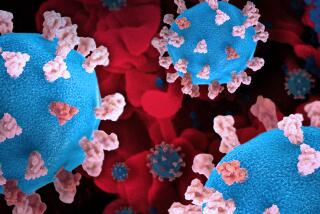Drug Blocks HIV in Tests
- Share via
Scientists have long sought a vaginal gel that women could apply before sex to block the AIDS virus. Now they’ve found a new lead -- a chemical designed to thwart the way HIV penetrates women’s cells.
The experimental drug isn’t ready for human testing, but it provided potent protection to female monkeys exposed to large amounts of an AIDS virus, researchers from Case Western Reserve University reported Thursday in the journal Science.
The chemical prevented HIV from invading vaginal tissue by blocking its preferred cellular doorway, the first evidence that targeting that portal was sufficient to prevent infection.
AIDS specialists called the discovery a promising step in the quest for so-called topical microbicides -- gels or creams that women could use to protect themselves without having to get a man to agree to a condom.
HIV infection is rising more rapidly among women than men in many parts of the world.
HIV invades cells through “receptor” molecules on their surfaces; it prefers one called CCR5. Scientists have long known that people who lack CCR5 because of genetic mutations hardly ever get HIV -- and that the body harbors another molecule called RANTES that can block HIV by sticking to CCR5 first.
Swiss researchers created a RANTES, thousands of times more potent at blocking CCR5, that was used in the Case Western study. At the highest levels used, it completely blocked infection in females.
The CCR5 molecule is expensive, but researchers hope to find a simpler, less expensive, and equally effective alternative.





